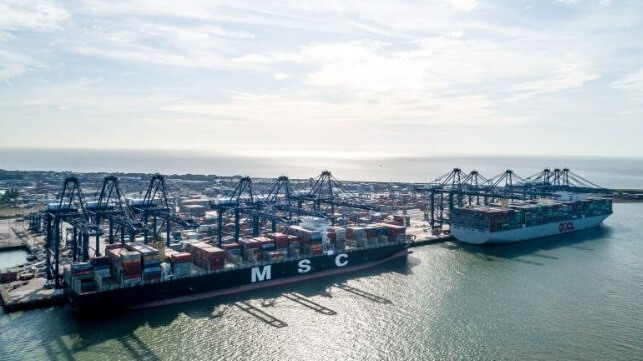UK Follows EU in Moving to End Exemption from Antitrust Rules for Carriers

UK regulators reversed their earlier decision regarding the oversight of the container shipping segment releasing a provisional decision not to recommend replacement of the current Liner Shipping Consortia Block Exemption regulation. At the beginning of 2023, the UK’s Competition and Markets Authority (CMA) said it was seeking input after reporting it was considering recommending an extension. The UK would be following the European Union which also proposes to end the exemption governing the application of competition regulations.
The UK is currently working on a transition of the existing regulation that was inherited from the UK’s time as a member of the EU. After Brexit, the UK set a transition period and now it is facing the April 2024 expiration of the exemption and must decide its course of action. In January, the CMA asked for comments from the industry and related organizations on its decision to recommend an extension to the then Secretary of State for Business, Energy, and Industrial Strategy.
The exemption came about after the old shipping conferences gave way to the modern alliances between carriers. The European Commission introduced the exemption in 1995 which permitted carriers greater latitude in steps such as coordinating schedules and sharing capacity exempt from the potential of antitrust violations. The exemption has been renewed at five-year intervals. The EU reported in October that it had decided to let the exemption lapse in April 2024.
The CMA began its independent review of the exemption in August 2022 highlighting the historical arguments that the ability of the industry to work in a consortium produces significant efficiencies, allows smaller companies to compete in the market with the large carriers, and that it reduces the burden of compliance on the carriers.
In reviewing the comments, the CMA reports that the liner industry continued to advocate for the benefits of the exemption. Critics however argue that it fails to deliver benefits to customers and provides more scope of cooperation between competing lines than is necessary. They also argued that with a significant portion of capacity now operated by large carriers that have significant market share, the cost of compliance with self-assessment is manageable.
CMA has come to the same conclusion in its provisional decision. They looked at issues such as routes and the consolidation of the carriers, the position of the UK in global shipping networks, the evolution of the consortia agreements and alliances, and the core issues of efficiency and the effect on competition. Among the CMA’s conclusions was that there was a lack of evidence of the exemption providing benefits to recommend the extension. They looked at the efficiencies that the exemption was to provide and if they outweighed the potential impact on competition.
The CMA notes that if its final decision is to not recommend an extension, it does not mean the carriers can no longer work together but that they would need to conduct additional self-assessments on compliance while having the option to use alternative exemptions. The authority is asking for final input by December 15 and will issue its final recommendation after reviewing the comments.

that matters most
Get the latest maritime news delivered to your inbox daily.
The liner industry has been vocal in its opposition to the decision in the EU and is reported to be lobbying in London for the extension. They believe it will harm especially smaller carriers and reduce the quality of service and frequency on smaller routes.
The British International Freight Association issued a statement welcoming the provisional decision by the CMA while calling for members to continue to advocate for the final decision. They argue that the decision would only mean closer scrutiny for the carriers not ending the shipping line consortia and alliances. They point to the cost increases during the surge in volumes during the pandemic and the issues shippers experienced saying the exemption gives the carriers too much power and authority. Ending the exemption, they propose, would lead to a more cooperative relationship between carriers and shippers.
